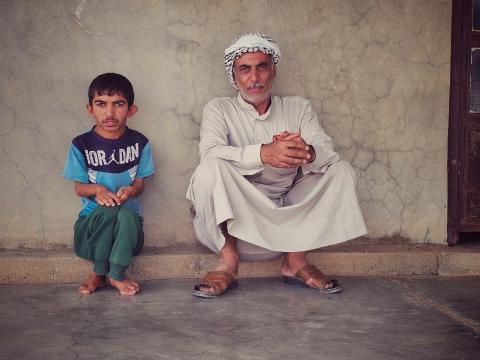Mahran’s voice: a call for basic rights

In the remote Rashad District, 46.2 Kilometers away from Kirkuk, 19-year-old Mahran begins each day before sunrise. Despite being paralysed in both legs, he crawls outside to feed the family’s livestock — a responsibility he carries out with quiet determination. Born into a large household of twelve, Mahran lives with his seven sisters, two brothers, and parents in an isolated home where even the most basic necessities are out of reach.
“I never went to school,” Mahran shares, “but I know how to count.” His days are simple and repetitive: tending the animals, resting, and sometimes crawling to the village centre to visit his cousins - a rare change from his otherwise confined routine. Without a wheelchair or proper facilities, the world remains largely inaccessible to him.
To relieve himself, Mahran uses a concrete block in the toilet, and he moves around the house and outdoors by crawling. There are no handwashing facilities he can reach, no way for him to bathe properly. “If one thing could change my life,” he says, “it would be a wheelchair and a toilet I can use without pain. I dream of being like anyone else - to go outside, enjoy life, and see the world.”
The family’s access to water is extremely limited. They collect water from a nearby river, which is often contaminated. When they can afford it, they purchase water from neighbouring villages, spending between 75,000 and 100,000 Iraqi dinars (57 USD and 76.32 USD per month). But it only lasts two days. With twelve people under one roof, that water is used for everything: drinking, cooking, washing, and cleaning.
Mahran’s father, once the sole breadwinner, now suffers from heart disease and can no longer work regularly. “I can’t go to Baghdad for treatment,” he says. “We simply don’t have the money. We rely on the help of charitable people․ Without them, we wouldn’t get by.”
Health problems are widespread in the family. One of Mahran’s sisters has thalassaemia. Other children suffer from stomach illnesses and skin conditions caused by the dirty water. Even their livestock, a vital source of income and food, are falling ill.
One of the older sons, in his final year of secondary school, was forced to miss his exams due to sickness. The local school is two kilometers away, and the children walk 45 minutes each way, sometimes barefoot through thick winter mud. When they arrive, they clean themselves before putting on their shoes again.
“We’re not asking for more than others,” their father says. “We just want to live like everyone else, to meet the basic needs of life. We need clean water, a water tank to last us ten days, and a simple filter. And Mahran — he needs a wheelchair, a decent toilet, and washing facilities. That’s all.”
The father’s voice cracks as he adds, “I feel heartbroken that I can’t give my children even 250 Iraqi dinars. I want them to study. I want them to succeed. I don’t know how long I have left with this illness, and my dream is for at least one of my children to reach a better place in life, and to help support the others.”
And Mahran’s soft but determined voice echoes that hope: “Please help me get a wheelchair. Please help us with clean water and a proper toilet. I just want to live with dignity, like anyone else.”
Before the conflict of 2014, the Rashad subdistrict, including all its villages, had a population of around 25,000. Today, only about 6,000 individuals have returned. Abdulqahar Abdulla, World Vision Iraq Project Manager in Kirkuk, said, “In Rashad, life has become a daily struggle for thousands like Mahran. Once home to 25,000 people before the conflict, only a small number have returned to villages stripped of basic infrastructure and clean water. Years of neglect, drought, and damaged water systems have left families relying on irrigation canals or expensive water deliveries that barely last.The drought has deepened the suffering, affecting not only human health but also livestock and crops. Clean water, safe toilets, and simple tools like a water tank or wheelchair could transform lives. For people like Mahran, who ask only for dignity and the chance to live without pain, water, sanitation, and hygiene support is not a luxury, it’s a lifeline.”
Meanwhile, Khalil Hamid, Operations Manager for World Vision Iraq, noted about this urgent need in Rashad subdistrict, “Rashad is one of the areas with the most critical water, sanitation, and hygiene needs I have encountered in Iraq. The community lacks access to clean water, with residents relying on raw water from irrigation canals. Open defecation is widespread, and four to five households often share a single unimproved latrine. None of the schools or healthcare facilities have basic access to clean water, sanitation, or hygiene services. Moreover, none of the schools are equipped with child, disability-, or gender-friendly water, sanitation, and hygiene facilities. Despite the severity of needs, Rashad remains significantly underserved, with a minimal presence of humanitarian and development actors.”